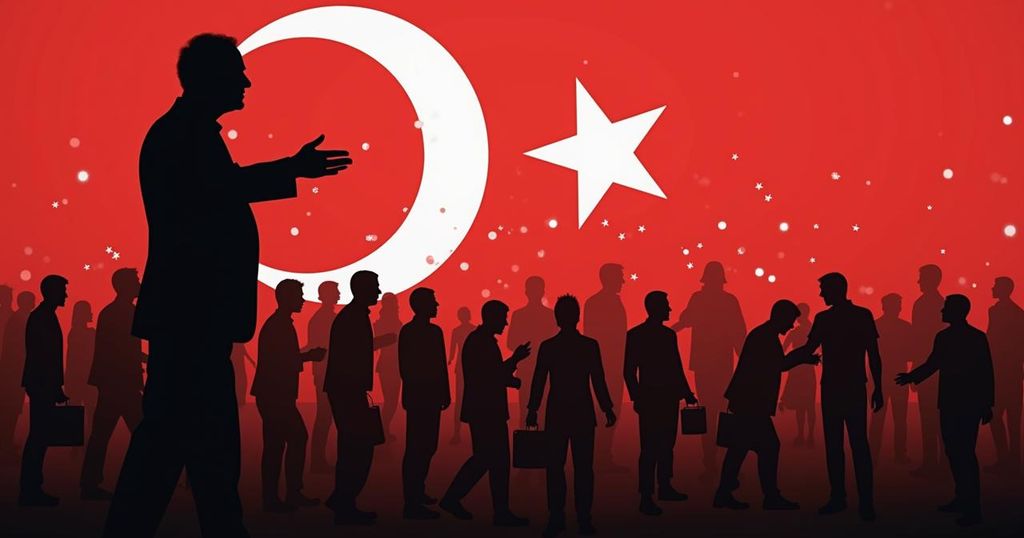President Kais Saied of Tunisia is projected to win the presidential election with 89.2 percent of the vote amid low voter turnout, with only 27.7 percent of the electorate participating. Saied’s consolidation of power since 2021, marked by the suspension of parliament and a new constitution, has led to criticism and a call for election boycotts from opposition groups. His challengers, among whom are an imprisoned businessman and a former ally, have struggled to gain traction, reflecting a broader disillusionment with the political process in Tunisia.
Tunisian President Kais Saied is poised to achieve a significant electoral victory in the presidential election, garnering an estimated 89.2 percent of the votes according to an exit poll aired on state television. This would reinforce Saied’s leadership, particularly following his 2021 power consolidation. Detailed official results are anticipated to be disclosed on Monday evening. Voter turnout, however, has been disappointingly low, with fewer than 30 percent of registered voters participating in what marks Tunisia’s third presidential election since the 2011 Arab Spring revolution. President Saied faced off against two challengers: the imprisoned businessman Ayachi Zammel and Zouhair Maghzaoui, a former ally turned leftist contender. Ultimately, Saied’s chances appear favorable, as his opponents have been largely marginalized or detained. Saied ascended to power by exploiting widespread discontent with the political establishment that emerged after the Arab Spring. His administration has been characterized by significant political shifts and economic challenges, particularly following the suspension of parliament and the introduction of a new constitution in 2021. Opposition factions have actively campaigned for a boycott of the election, labeling it a farce. With polling concluded, only 2.7 million of the electorate, approximately 27.7 percent, cast their votes—a substantial drop from the 49 percent participation in the first round of the 2019 election. Despite a number of candidates expressing intentions to contest Saied, the election commission, which is exclusively appointed by him, permitted only three to run. Saied, now 66 years old, dissolved the parliament in July 2021 and began governing by decree, a move that many critics have denounced as a coup d’état. He has asserted that he would not relinquish power to what he deems “non-patriots”. When announcing his candidacy, he dismissed claims of restrictions on competitors, declaring, “There are no restrictions on potential candidates for the presidential elections… this is nonsense and lies.” Furthermore, he emphasized the sovereignty of the Tunisian people, stating, “We will not accept any foreign party interfering in the choices of our people.” Economically, Tunisia struggles with substantial challenges, including a public debt that has soared to over 80 percent of the national GDP, significantly higher than the less than 40 percent recorded in 2010 prior to the Arab Spring. Additionally, the current account deficit has reached 15 percent of GDP, exacerbated by surging import prices of essential goods and energy amid global inflation and the ongoing conflict between Russia and Ukraine.
This article discusses the recent presidential election in Tunisia, emphasizing the anticipated victory of President Kais Saied amid low voter turnout. It highlights the socio-political context in Tunisia since the Arab Spring, illustrating how Saied has consolidated power since 2021, leading to economic challenges and opposition reactions. The piece provides insights into voter engagement and the perception of the electoral process while pointing out the restrictions faced by potential candidates. By examining Saied’s rise to power, the article sheds light on contemporary Tunisian governance and its implications for democracy in the region.
In summary, Tunisia’s presidential election appears poised to further entrench Kais Saied’s authority, with a predicted landslide victory despite significant voter apathy. The reduced turnout underscores the national disillusionment with the electoral process, exacerbated by the incumbent president’s prior actions to consolidate power and stifle dissent. The challenges facing Tunisia, particularly in economic terms, highlight the precarious state of the nation as it navigates its post-Arab Spring trajectory.
Original Source: www.middleeasteye.net







